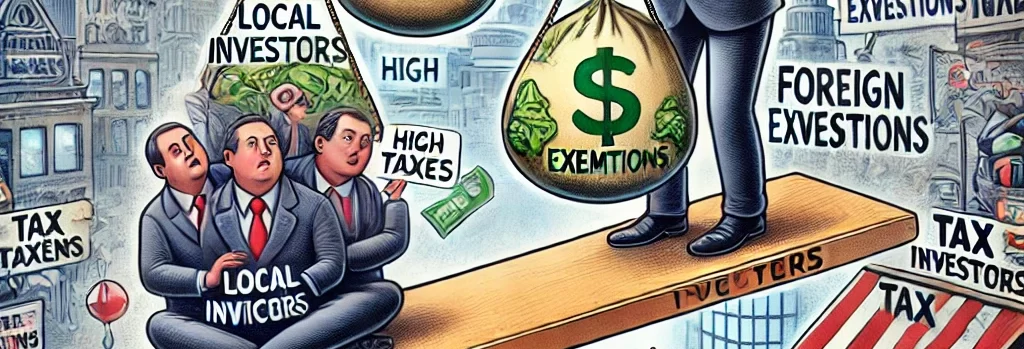
Why Are Foreign Investors Favoured Over Local Ones?
I’ve always questioned why governments offer generous tax exemptions to foreign investors while imposing heavy taxes on local businesses. Why prioritise newcomers who have no stake in the local market over long-established companies that contribute to economic stability? Does this policy truly create jobs, or does it simply shift employment opportunities, making it harder for local businesses to compete?
A key concern is that while foreign investors enjoy tax-free profits, locals are burdened with high taxation. This raises fundamental questions about fairness and economic strategy. Is this about power, wealth redistribution, or simply outdated economic policies?
I usually focus on HR development and leadership, but this issue deserves a broader discussion. Below are some insights into the economic impact of such tax policies and why they may be counterproductive.
1. How High Dividend Taxes Affect Investment Behavior
Research shows that high dividend taxation discourages local investment and pushes capital abroad. For example, a 2022 study on the Palestine Stock Exchange found that higher corporate income taxes led businesses to adjust their payout structures, limiting reinvestment in the domestic economy. Similarly, a 2019 study on Pakistan’s banking sector revealed that excessive dividend taxes reduced investor confidence, leading to capital flight.
When domestic tax policies are overly restrictive, investors naturally seek environments with lower tax burdens, reinforcing the trend of capital outflow.
2. The Hidden Cost to the Domestic Economy
The preference for foreign investors over local ones comes at a price:
- Declining Local Investment: When local investors face excessive taxes, they struggle to expand, limiting job creation.
- Reduced Competitiveness: Favoring foreign companies disrupts fair competition, making it harder for local businesses to thrive.
- Long-Term Revenue Decline: Governments may see short-term gains from taxing locals, but over time, discouraging domestic reinvestment leads to a shrinking tax base.
A 2022 study on tax policies across Arab nations found that shifting from high corporate dividend taxation to alternative structures could enhance investment and economic growth, particularly in lower-income countries.
3. Why Governments Resist Tax Reform
Despite clear drawbacks, many governments hesitate to reform tax policies for several reasons:
- Short-Term Revenue Needs: Dividend taxes provide immediate revenue, even if they harm long-term economic growth.
- Bureaucratic Inertia: Policy changes require political will, which is often lacking.
- Dependence on Foreign Investment: Governments often try to offset capital flight by attracting foreign investors through tax breaks, even if it distorts market dynamics.
- Political Ideology: Some policymakers see high local taxes as a tool for wealth redistribution, despite the unintended economic consequences.
4. A More Sustainable Approach to Taxation
Instead of relying on policies that push local investors away, governments can:
- Implement a balanced tax system that encourages both local and foreign investments.
- Offer tax credits to companies that reinvest in domestic growth.
- Reduce dividend tax burdens while shifting focus to indirect taxation.
- Improve the overall ease of doing business to retain local capital and attract sustainable foreign investments.
Conclusion: Time for a Policy Rethink
Empirical evidence shows that favouring foreign investors while taxing local businesses heavily is counterproductive. High dividend taxation leads to capital flight, weakens domestic investment, and ultimately reduces long-term tax revenue.
If governments want to drive sustainable economic growth, they need to rethink their tax policies. Instead of chasing short-term revenue, a more strategic approach—one that levels the playing field for both local and foreign investors—is necessary for long-term prosperity.
Dr youssef Lamaa


Leave a Comment